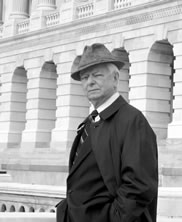Because of his lifetime commitment to and interest in the discipline of history, Senator Robert C. Byrd was chosen by the AHA Council to be the first recipient of the Theodore Roosevelt-Woodrow Wilson Award.

Robert C. Byrd
Senator Robert C. Byrd is the classic self-made and self-educated man, who has made his life a continuing quest for knowledge, particularly the study of history. Born in North Carolina in 1917, he was raised in the coal mining regions of West Virginia. He won election to the state house of delegates in 1946, to the US House of Representatives in 1952, and to the United States Senate in 1958. Although he never had the opportunity to attend college he attended law school at night at American University as a United States Senator. President Kennedy presented his law degree at graduation in 1963. Byrd attended several colleges as an undergraduate and ultimately received his BA from Marshall University in 1994.
Senator Byrd was elected Senate Democratic Whip in 1971 and Senate Democratic Leader in 1977. He served as majority leader from 1977 to 1981, and again from 1985 to 1989, during which time he led the effort to ratify the Panama Canal treaties and to extend civil rights legislation. In 1989 he became chairman of the Senate Appropriations Committee and President Pro Tempore of the Senate, holding those positions until 1995 and again from 2001–03. During the 1980s, he delivered 100 speeches on the floor dealing with various aspects of the Senate’s history, which were published in four volumes as The Senate, 1789–1989: Addresses on the History of the Senate (Government Printing Office, 1989–94), the first volume winning the Society for History in the Federal Government’s Henry Adams Prize as “an outstanding contribution to research in the history of the Federal Government.” He also published The Senate of the Roman Republic: Addresses on the History of Roman Constitutionalism (Government Printing Office, 1995).
In 2001, Senator Byrd introduced legislation now know as the “Teaching American History” grants—to be used to improve the teaching of American History, as distinct from social studies, in America’s public schools. Initially granting $50 million, the program, administered through the Department of Education, currently funded by at $100 million. The goal of this program for school districts and institutions with expertise in American history to collaborate over a three-year period to help teachers develop the knowledge and skills necessary to teach traditional American history in an exciting and engaging way. The department awarded 61 grants in 32 states in 2001; 114 grants in 2002 located in 39 States and the District of Columbia. The awards for 2003 were announced in September.